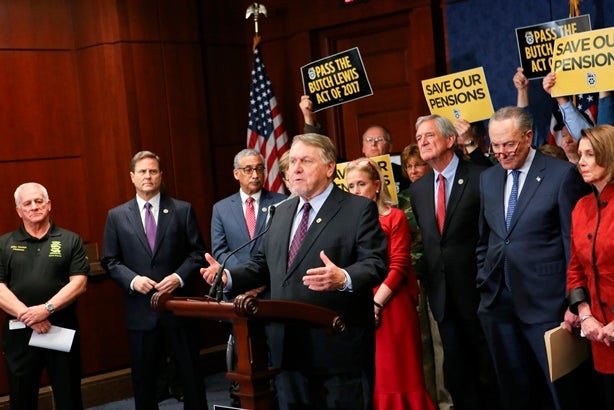News
It’s Time to Protect Pensions

Pensions supply a secure retirement for millions of Americans across the country. But increasingly, some plans have faced financial challenges that threaten the nest eggs of many who toiled for decades with the understanding they would be taken care of in their golden years.
About 200 multi-employer pensions across the country, including the Teamsters’ Central States Pension Fund that oversees the retirements of hundreds of thousands of Teamsters, stand on the brink of failure.
The Teamsters have been working diligently for years with key members of Congress trying to come up with a solution to this pension crisis. And with the release of new legislation, the union believes it has found it.
The bill would boost financially troubled multi-employer pensions so they don’t fail. It would create a new agency under the U.S. Treasury Department that would sell bonds in the open market to large investors such as financial firms. The dollars raised, in turn, would go to these retirement plans to stave off cuts or complete failure.
Sen. Sherrod Brown (D-Ohio) is a lead sponsor of the measure, called the “Butch Lewis Act of 2017,” named after the former Local 100 President who died in 2015 while fighting to prevent cuts to Central States Pension Fund. He said workers deserve to receive the pensions they worked so hard for to get.
“This bill is comprehensive. It includes the miners, the Teamsters and others,” Sen. Brown said. “It makes no cuts. We started with the ideas of no cuts and there will be no cuts. This is a plan that will work.”
A new agency, the Pension Rehabilitation Administration (PRA), would lend money from the sale of the bonds to the financially troubled pension plans. Plans that are deemed “critical” and “declining,” as well as recently insolvent but non-terminated plans and those that have suspended benefits would be eligible to apply for the program. For those plans needing additional help, the Pension Benefit Guaranty Corporation would be available to make up the difference.
Pension plans borrowing from PRA would be required to set aside money in separate safe investments such as annuities or bonds that match the pension payments for retirees. Those applying for loans to the PRA would also have to submit detailed financial projections. The PRA would be charged with approving all loans before they could be issued. Pension plans that have borrowed money would have to submit reports every three years to the PRA to show that the loans are working.
If failing pension plans are allowed to go belly up, the retirement benefits of some 1.5 million Americans could be at risk. That, in turn, would affect the nation’s coffers. In 2015, for instance, multi-employer pensioners paid more than $35 billion in federal taxes.
It’s time lawmakers stick up for working Americans who have played by the rules. Passing this bill would be a good start.